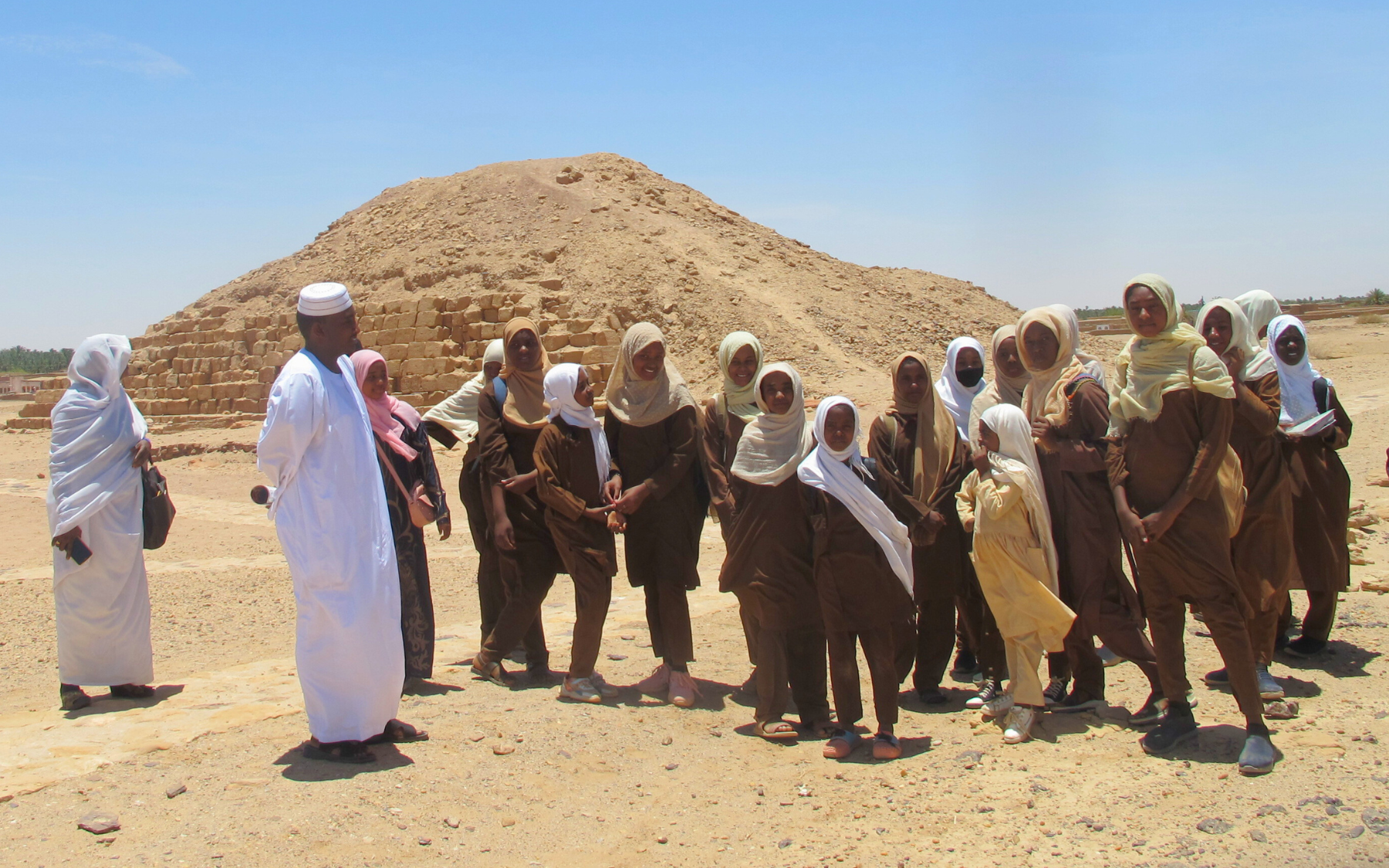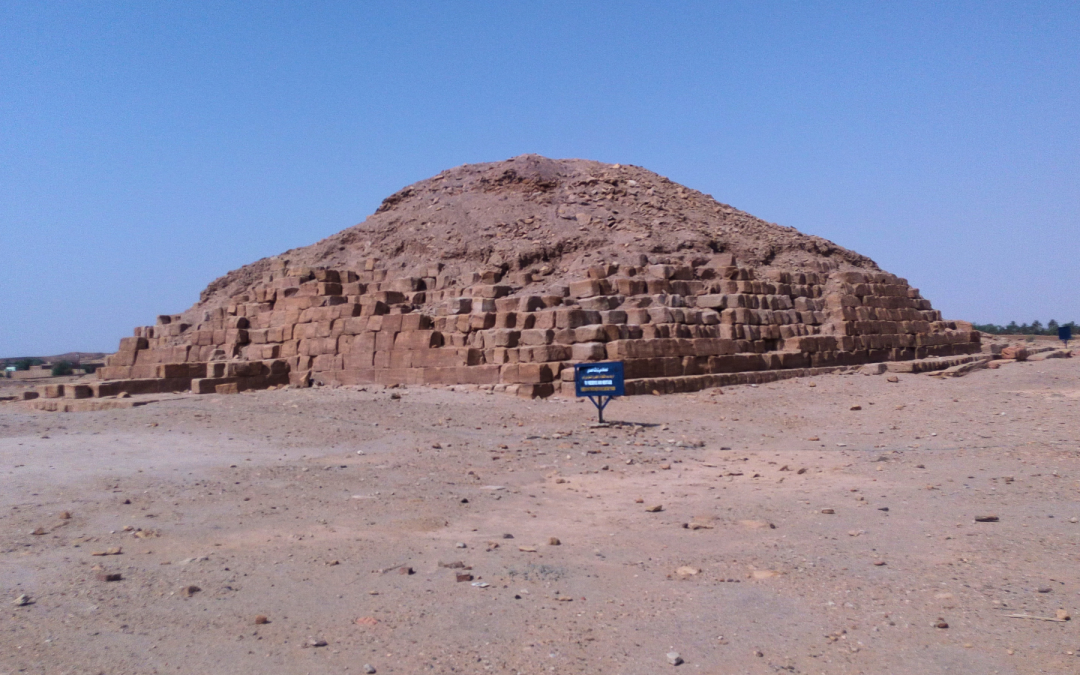In northern Sudan, the oasis banks of the Nile River are verdant with palm trees and lush gardens, a slender green ribbon decorating the expansive beauty of the Nubian Desert. In the village of El-Kurru, from a sandscape dotted with the fossilized timbers of a petrified forest, ancient history rises in the form of towering Kush pyramids from the seventh century BCE.
“I grew up right next to these monuments, but I did not know their complete story,” says Anawar Mahagoub Ali Mohamed, a Rackham student in his first year of the Master’s in International and Regional Studies program (MIRS).
In 2013, when a team of researchers from U-M and the University of Copenhagen were leading the first modern excavation of the archeological sites at El-Kurru, Anawar saw an opportunity to learn more about his village’s pyramids.
“I was studying law at the University of Dongola at the time, but home on break. The research team was hiring, so I started as a laborer, just shoveling. I thought it would be an interesting chance to learn from academics and scientists with so much experience,” Anawar says.
Engaging the Community
In 2021, the U-M Humanities Collaboratory supported an extension of the archeological work in El-Kurru through a project called Narrating Nubia, committed to decolonizing anthropological fieldwork practices in the region through reparative research methods such as community engagement.
Anawar was brought into the Narrating Nubia project as a community engagement specialist, conducting a photo contest to encourage the residents of El-Kurru to share images of their daily life.
“The photo contest gave the people of El-Kurru the chance to tell their own stories and reflect their own perspectives about our heritage,” Anawar says.
“When conducting archeological research, it’s important to learn from what the community says and what the community doesn’t say. It’s also important to simply respect their values.”
Cultural Reclamation

An important part of the Narrating Nubia project is the creation of a Heritage Center (pictured here), co-created through a partnership with the U-M research team and the Kurru community. When completed, the center will offer a place for the Kurru community to reflect on their history and their contemporary heritage, support creativity, and fulfill community needs.
Through his engagement with Narrating Nubia, Anawar surfaced stories he’d grown up hearing fragments of, passed down generationally from the last excavation of the site in 1918 by American archeologist George Reisner, aided by a team of Egyptian researchers.
“Our ancestors in El-Kurru were hired as laborers, carrying boxes from one place to another,” he says.“They weren’t told what was inside of them. Some people started to speculate that maybe those buried in the pyramids were Egyptian or Reisner’s ancestors, that they were not our ancestors.”
In fact, the monuments are a royal pyramid cemetery of the Kingdom of Kush, an ancient civilization that spanned northern Sudan and southern Egypt. They are direct ancestors of the residents of El-Kurru.
The Kingdom of Kush
Anawar’s village of El-Kurru served as the royal cemetery for Kush’s early kings and queens. Many believe that the Kush were historically overlooked by European and American scholars, who were eager to convey this idea of Egypt as the cradle of Western civilization but largely excluded Kush, an African culture, from the historical narrative.
The Narrating Nubia project sought to address this exclusion and take active measures to include the voices, experiences, and needs of Kush descendants, the residents of El-Kurru.
“In the early 20th century, George Reisher lived apart from the village in his own camp for the entirety of his research trip,” Anawar says. “The U-M research team lived in the village and developed friendships with the community.”
Leaving Our Mark
The Narrating Nubia team also valued Anawar’s friendships, bringing local school teacher and Anawar’s lifelong friend Hamoud Ibrahem into the project after Raheem suggested that it would be good to have a picture book about the pyramids to use in village classrooms.
The book, Leaving Our Mark, supervised by Geoff Emberling, an associate research scientist at the Kelsey Museum of Archeology and co-edited by Raheem and two Rackham students, Heidi Hilker, a Ph.D. student in the department of Middle East studies, and Shannon Niss, a Ph.D. candidate in the interdepartmental program in classical art and archaeology. Niss also holds a Museum Studies Certificate from Rackham’s Museum Studies Program. Nubian artist Bassam Ahmed is illustrating the book with U-M undergraduate student Shannon Burton. Anawar is handling the book’s translation, ensuring the story’s integrity in both English and Arabic. The group is in search of a publisher to bring the book to market. The collaboration, Anawar says, has been healing.
“I remember when we were in elementary school, the only information we got about the site was three lines in a book describing the Kingdom of Kush, not even mentioning the names of the queens or the kings,” Anawar says.
In Leaving Our Mark, two children walk through their village asking neighbors, elders, and the archeologists about the pyramids and beliefs of the Kush.
“It’s very important to keep the kids in our village connected to our stories,” Anawar says.

As part of the Narrating Nubia project, the U-M team worked with local schools to create and implement educational material about the Kush kingdom. Here, students visit the Royal Cemetery of Kings and Queens of Kush Kingdom as part of the project’s school visit program.
Culture in Crisis
The work to preserve Sudanese culture and community is critical, especially since genocidal violence has ravaged the nation since April 2023. Currently, the generals of two military groups–the Rapid Support Forces and the Sudanese Armed Forces–battle for power, using militias with ethnic cleansing agendas to enact their ground operations. Thousands of civilians have died, and over 5.7 million people have been forcibly displaced, many fleeing to northern villages like El-Kurru where there is relative safety.
“The population of El-Kurru has more than doubled,” Anawar reports, speaking of the displacement.
“It’s a shame to make camps. We don’t do that. We host people in our houses, we share food. The people of El-Kurru are very kind and connected, a generous community. I believe it is passed down from our forefathers to us. It comes from a time deep in our history, from the Kingdom of Kush.”
How Rackham Helps
Anawar is a 2023–24 Arab Alumni Scholarship Fund recipient and has participated in Rackham Graduate School professional development workshops.
“I want to acknowledge the support of Rackham Graduate School, thank them for offering valuable training opportunities, and express my gratitude for the chances they provide for students from around the world to pursue and make progress in their academic life.”

